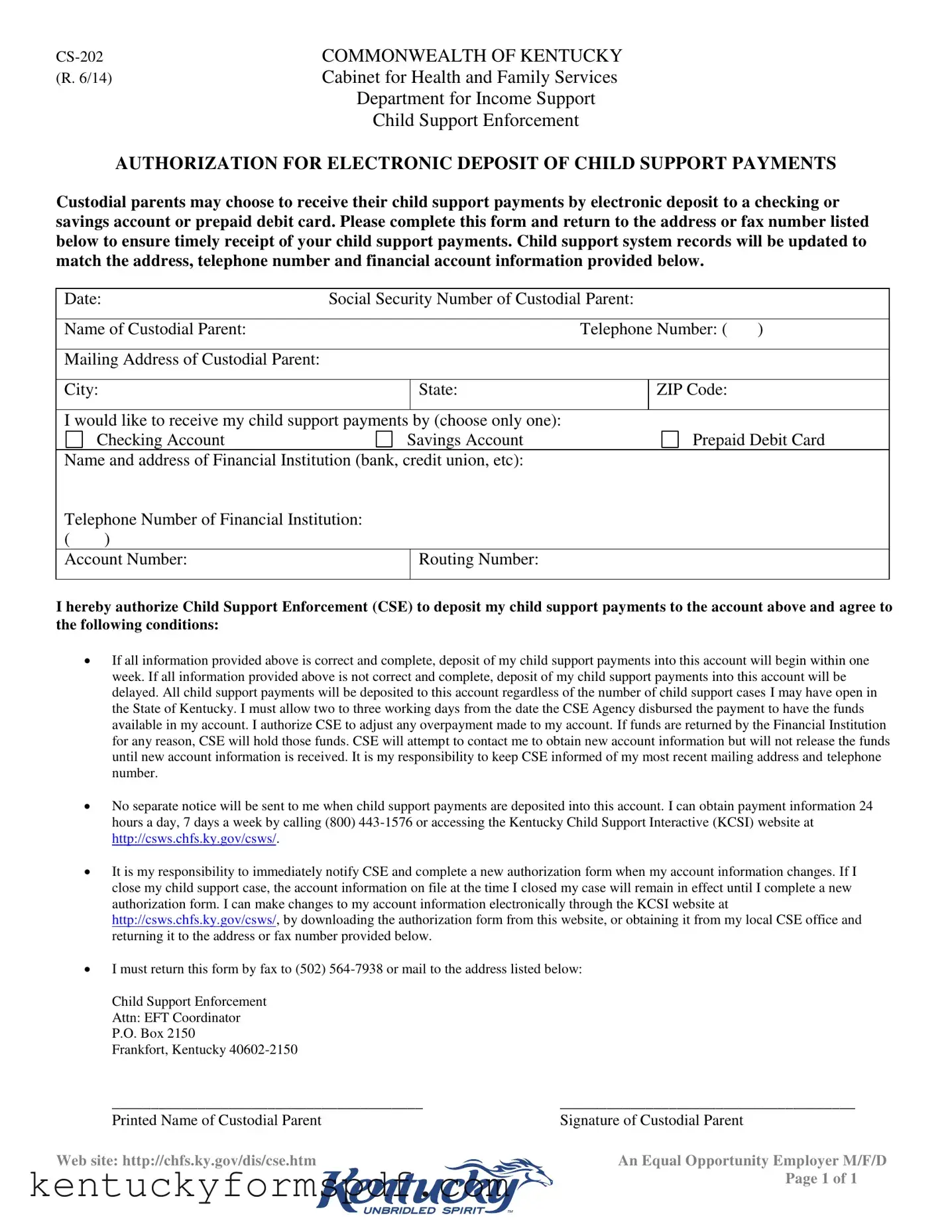The Kentucky CS-202 form is similar to the Child Support Payment Authorization form used in many states. This document allows custodial parents to authorize direct deposit of child support payments into their chosen bank account. Like the CS-202, it requires personal information such as the custodial parent's name, Social Security number, and banking details. The aim is to streamline the payment process and ensure timely receipt of funds, just as the CS-202 does for Kentucky residents.
Another comparable document is the Direct Deposit Authorization form often utilized by employers for payroll deposits. This form collects essential banking information to facilitate electronic deposits of salaries. Similar to the CS-202, it requires details like account numbers and routing numbers. Both forms share the goal of ensuring that funds are deposited directly into the designated account without delay.
The Electronic Funds Transfer (EFT) Authorization form is also akin to the CS-202. This document is used for various types of payments, including government benefits or refunds. It similarly gathers personal and financial information to authorize direct deposits. The common thread is the emphasis on electronic transfers, which enhance efficiency and reliability in payment processing.
In addition, the Automatic Payment Authorization form used for recurring bills mirrors the CS-202's purpose. This form allows individuals to set up automatic payments for services like utilities or loans. Both forms require the account holder's consent and banking details, ensuring that payments are made consistently and on time.
The IRS Form 8888, Allocation of Refund, is another similar document. Taxpayers can use this form to direct their tax refunds into multiple accounts. Like the CS-202, it emphasizes the importance of accurate banking information to avoid delays in receiving funds. Both forms aim to provide a hassle-free way to manage money electronically.
The Bank Account Change Form also aligns closely with the CS-202. This document allows individuals to update their banking information for various services, including child support. It ensures that payment sources remain current and helps prevent disruptions in receiving funds, much like the CS-202's requirement for up-to-date account information.
Additionally, the Prepaid Debit Card Application shares similarities with the CS-202. This application enables users to receive funds on a prepaid card, which is an alternative to traditional bank accounts. Both documents require personal information and aim to facilitate easy access to funds, catering to those who may not have a conventional bank account.
In the realm of legal documents, the significance of a Bill of Sale cannot be overstated, serving as a crucial mechanism for transferring ownership and ensuring clear communication between parties. For instance, in California, understanding the nuances of the https://topformsonline.com/ can aid sellers and buyers alike in avoiding potential disputes by accurately documenting the sale details, thus reinforcing the trust necessary for smooth transactions.
The Direct Deposit Change Form is yet another document that resembles the CS-202. This form is used when individuals need to change their direct deposit information for various payments, including pensions or social security. Like the CS-202, it requires detailed banking information to ensure that future deposits are routed correctly and without delay.
Lastly, the Student Loan Payment Authorization form is similar in that it allows borrowers to set up automatic payments for their loans. This form collects banking information to facilitate timely payments, mirroring the CS-202's focus on ensuring that child support payments are received promptly. Both forms prioritize the accuracy of financial details to avoid any interruptions in payment flow.

